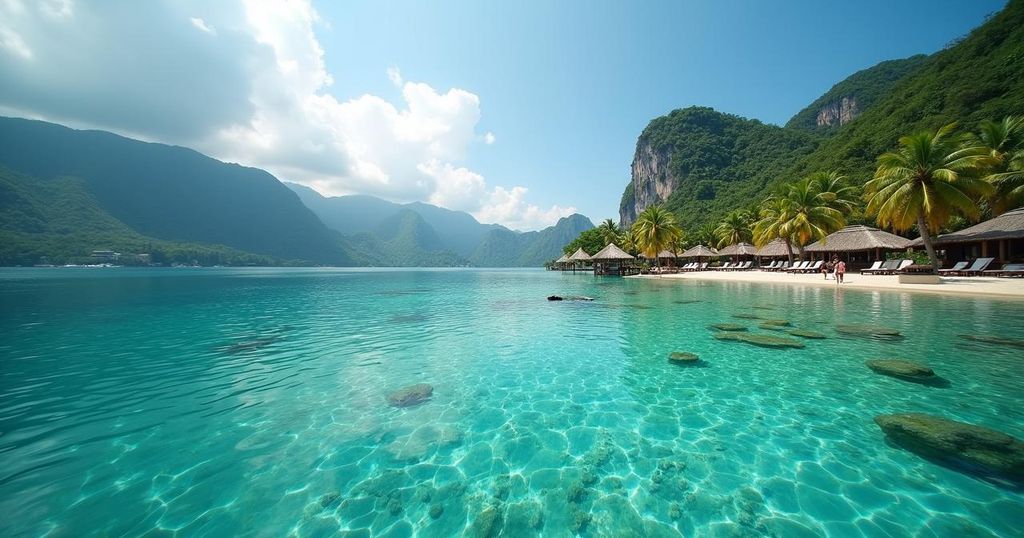Phuket Tourism Operators Express Concerns Over Climate Change Impact

Phuket tourism operators express concern over climate change, leading to severe weather and infrastructure challenges. Increased flooding has become an annual occurrence, with calls for government intervention to improve disaster preparedness and regulatory measures. Despite potential disruptions to tourist travel patterns due to natural disasters, Phuket’s diverse market may buffer adverse effects, with the Tourism Authority of Thailand promoting eco-friendly tourism initiatives.
Tourism operators in Phuket are increasingly concerned about the repercussions of climate change, which is giving rise to extreme weather conditions and flooding in Thailand, as well as in regions from which tourists originate. Thaneth Tantipiriyakij, president of the Phuket Tourist Association, highlighted that flooding has become a recurrent issue, particularly affecting the areas of Kata, Karon, and Kamala this year. He pointed out that several months prior, landslides due to intense rainfall in Kata and Karon resulted in the fatalities of foreign nationals. Recently, flooding submerged parts of the roadways in Kamala. Despite these challenges, Mr. Thaneth expressed that such events, while inconvenient and causing traffic disruptions, do not seem to significantly deter tourists from traveling to Phuket. However, he lamented the lack of proactive measures from the central government to upgrade Phuket’s water management and urban infrastructure. Phuket expects to generate approximately 500 billion baht in tourism revenue this year, which surpasses the figures seen during the pre-pandemic era. Yet, Mr. Thaneth noted that infrastructure maintenance has struggled to keep up with the influx of visitors. Virintra Papakityotsaphat, president of the Tourism Council of Phuket, emphasized that climate change-induced natural disasters pose a critical risk to the tourism sector. She articulated the necessity for the government to implement regulatory measures and enhance infrastructure resilience in light of these unavoidable challenges, specifically denouncing illegal construction that obstructs floodways or areas designated for water retention. Recent natural disasters such as Hurricane Helene and Hurricane Milton, which caused widespread havoc in Florida, could potentially dissuade tourists from traveling internationally, particularly during peak season for long-haul travel to Thailand. Nevertheless, Mrs. Virintra noted that Phuket’s diverse tourist market—which includes visitors from Russia, Europe, India, and China—would somewhat cushion the impact. Siripakorn Cheawsamoot, deputy governor for marketing in Europe, the Americas, the Middle East, and Africa at the Tourism Authority of Thailand (TAT), stated there have been no reports of US tourists becoming stranded in Thailand due to flight cancellations. Nonetheless, he mentioned that some tourists may postpone their planned trips if they are unable to travel at this time. He stated that the recent natural disasters are expected to influence the American market only in the short term, and he remains confident that the TAT will still welcome at least one million US visitors this year. Furthermore, the agency is intensifying its efforts to promote Thailand as a preferable choice for eco-friendly and low-carbon tourism.
The article addresses the increasing challenges faced by Phuket’s tourism operators as a direct consequence of climate change. Encounters with extreme weather, such as severe floods and landslides, have prompted concerns regarding infrastructure inadequacy in the face of rising tourist numbers. Tourism stakeholders emphasize the need for government intervention to enhance disaster preparedness and regulate development practices that could exacerbate flooding issues. The impact of natural disasters on travel behavior and tourism revenue prospects is also explored, reflecting a broader trend in global tourism influenced by the increasing severity of climate-related incidents.
In conclusion, the tourism sector in Phuket is presently grappling with the adverse effects of climate change, particularly as it relates to extreme weather events impacting infrastructure and visitor experiences. Despite revenue expectations surpassing pre-pandemic levels, stakeholders underscore the urgent need for governmental action to enhance water management and urban planning practices. Although recent natural disasters pose a significant risk, Phuket’s appeal remains buoyed by its diverse tourist demographics. The focus on promoting sustainable tourism practices emerges as a crucial strategy in navigating the challenges posed by climate change.
Original Source: www.bangkokpost.com






